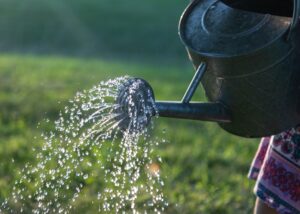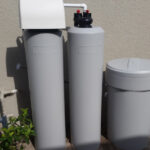A Reverse Osmosis unit is a type of water purification system. It removes harmful materials from water to make it clean and pure for drinking and cooking. The primary purpose of the RO filter is to remove pathogens like viruses and bacteria, as well as harmful chemicals and minerals, from the water before it reaches your home. For this reason, we are going to talk about why a reverse osmosis unit is right for you.
How Does Reverse Osmosis Work?
Reverse osmosis is a water treatment solution that uses the pressure difference in a liquid to separate contaminants from a solution. It was developed for:
- Removing salt from saltwater or brackish water to make it potable.
- Reduce heavy metals and other particular chemical pollutants in water systems.
The reverse osmosis (RO) procedure involves forcing the water from the tap through a semipermeable membrane that lets the water through but blocks bigger molecules like salt and other dissolved minerals. The process removes all impurities from the water, leaving only clean drinking water. In recent years, reverse osmosis systems have exploded in popularity in Florida and all over the United States. According to bestmoversinflorida.com, many homebuyers search for properties that include reverse osmosis systems.
What Does the Process of Reverse Osmosis Purify?
As mentioned, RO systems purify water by filtering pathogens and other unwanted substances, including bacteria, viruses, nitrates, sulfates, fluoride, and even arsenic. However, minerals, including magnesium, calcium, potassium, and sodium, all essential to good health, are also lost in the process. Overall, RO filters can purify drinking water by removing dozens of chemicals with a filtering efficiency of 99%. Moreover, some companies which make high-pressure professional RO filter make claims of up to 99.99% purity.

However, the effectiveness of low-priced RO filters is often substantially lower. This is why you must check the results of third-party lab testing and certifications for any product you’re considering. That being said, RO systems are not optimal for water softening or chlorine removal. Because of this, RO benefits from working in tandem with other filtration methods, like activated carbon filters. RO filters, in combination with a carbon filter, can effectively remove the following:
- Nitrate, at high enough concentrations, may be fatal to newborns.
- Perchlorate disrupts normal thyroid function and negatively affects children’s mental growth.
- Toxic arsenic stunts kids’ physical development, mental maturation, and immune system function.
- Hexavalent chromium – A form of chromium that is toxic to humans in all six of its atoms. It may affect children more than adults, including reproductive damage and cancer risk.
A Reverse Osmosis Unit Is Right for You Because It Is Thorough
Reverse osmosis is widely recognized as one of the most efficient methods for purifying water. Reverse osmosis filters for the home may eliminate up to 99% of lead, asbestos, and 82 other pollutants. These devices have eliminated boil water advisories in thousands of communities worldwide. This is because reverse osmosis systems treat drinking water more effectively than traditional water filtration systems. Because of its small size, a reverse osmosis filter membrane can remove larger impurities and dissolve more minor compounds from water.
With RO, You Have Water Purification on Demand
Water purification has the drawback of needing a lot of human input. Constantly filling the tank to meet the demands of your household’s water use can become really annoying. However, you can easily install a reverse osmosis water filter on a household sink’s faucet. It is convenient because it provides instantaneous access to pure water. It’s common for homeowners to forget they even have a water purification system after installing one of these devices.
Reverse Osmosis Is a Safe, Environmentally Friendly Alternative To Bottled Water
It’s common knowledge that using throwaway plastic water bottles is terrible for the environment. Still, less well-known is the fact that water purified via the process of reverse osmosis may be safer to drink. The New York Times noted that “the FDA does not require bottled water businesses to disclose to customers where the water originated from, how it has been treated, or what toxins the water may contain.” This is only one example of the industry’s renowned lack of oversight.

This is another reason why a reverse osmosis unit is right for you. A lot of companies that sell water filtration systems promise their customers that the water will be safe to drink and that the filtration system will work as advertised. Water filtered using a reverse osmosis system is not only better for you and your family’s health than water from plastic bottles, but it also saves you time and effort since you can get it by just turning on the tap.
Some Applications May Require Mineral-Free Water
Water filtered using reverse osmosis may be helpful for specific purposes, even though ultra-purified reverse osmosis water is unnecessary for families with access to pure tap water. Water purified using reverse osmosis, for instance, improves the flavor of food preparation since it contains fewer minerals and no additional fluoride. Many people who keep fish and coral in their homes use reverse osmosis systems to ensure that their creatures drink only the cleanest water possible, unadulterated by mineral supplements or other impurities.

People who want to conserve water in their gardens also use reverse osmosis units to eliminate minerals from their water supply before irrigating their plants. Even though most plants can withstand a wide variety of mineral concentrations in their water, some types, such as orchids and bonsai trees, require pure water to thrive. Therefore, installing a reverse osmosis unit in your home is good if you live in an area where the water supply is naturally high in minerals or if you frequently grow plants that are sensitive to soil pH. With all this said, now you can understand why a reverse osmosis unit is right for you.








